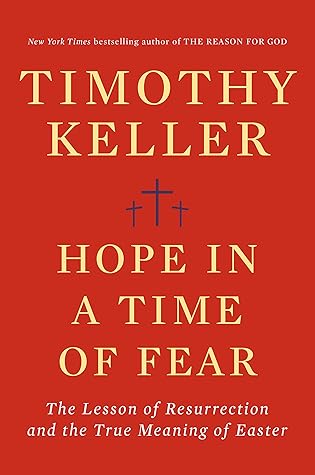More on this book
Community
Kindle Notes & Highlights
Read between
March 11 - May 17, 2021
Luther argues that to risk your own life needlessly, just to supposedly demonstrate your freedom from fear, is proud and reckless. Your life is not your own—it is God’s—and all human life is precious. The Bible demands quarantine for infected people (Leviticus 13–14), and so it is wrong to refuse the precautions and measures necessary to stop the spread of disease. Therefore, to “distance” and do everything to preserve your life and those of others is right and good.
If the fear is conquered, however, it enables you to then ask the important question with more objectivity: What is the most loving thing for me to do in my circumstances? And then you can do it.
We think that either you think highly of yourself or you think little of yourself. Paul is able to hold together two true assessments, namely, that in himself he is still a flawed, sinful man deserving of rejection and that at the very same time, in the grace of God, he is loved and fruitful. How can Paul do that? How can Paul say in one place, “I’m the worst of sinners,” and then confidently laugh in the face of death, challenging kings who could snuff out his life, and lead this history-changing movement?
Christian teaching on sex is highly controversial in the West today. When Christian rules and behavioral codes are compared with the modern culture’s mores about sex, they appear restrictive and unhealthy. People seldom explore the foundational logic behind the rules—what Hays calls principles, paradigms, and the worldview. That is what Paul did in this passage. Right in the middle of laying down rules about sexual behavior, he goes behind the rules and appeals to the resurrection of Jesus (1 Corinthians 6:14) and to our spiritual union with Christ through the firstfruits of the new creation
...more
The word meant any sexual intimacy outside an exclusive marriage relationship, not only adultery but premarital sex. “Porneia could be used to describe a whole array of improper sexual configurations: incest, prostitution, [premarital sex], homosexuality.”12
The Christian sex ethic was understood by the apostles to be a nonnegotiable part of orthodoxy, one of the core beliefs of Christianity.14 What Christians taught and practiced about sexuality was as much a necessary implication of the gospel and the resurrection as were care for the poor and the equality of the races.
These ordinances were unique among world cultures. They are incompatible with either strict socialism or laissez-faire capitalism. Craig Blomberg writes that therefore the Mosaic law “suggests a sharp critique of (1) statism that disregards the precious treasure of personal rootage, and (2) the untrammeled individualism which secures individuals at the expense of community.”6
One of the most striking things about the biblical account of injustice is its richness of analysis. In modern individualistic Western society there has been strong bias toward the belief that we are wholly the product of our individual choices.
But we cannot, as Marxist social theory has done, be just as reductionistic in the other direction, namely to insist that poverty and crime are never the result of individual moral choices but are always the product of social structures.
We are also both material and spiritual (2 Corinthians 5:1–10). We are not shaped only by our physiology, by our personal choices, or by social influences but also by spiritual forces, both good and evil, within us and surrounding us (Ephesians 6:10–13; Romans 7:14–25).
So are unjust conditions such as poverty produced by individual actions or by systemic, unjust social structures? The biblical answer is by both and yet much more than both. In
First, Christians can be active agents for change while avoiding the political polarization and rancor that creates gridlock and blocks wholesome change.
Second, Christians need to be willing to identify themselves as believers as they work with others for justice, though treating all their allies and partners as equals.
Third, I propose for all the reasons above that Christians especially work for justice locally and on specific issues rather than enter into the broad “national conversations.”


